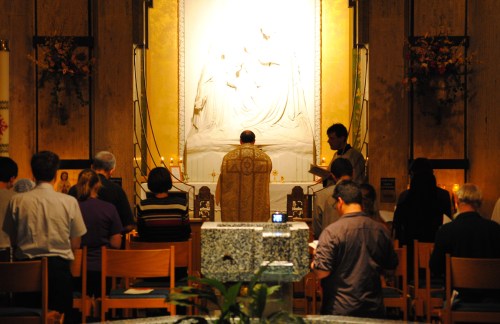Shrine of the Little Flower Hosts Second EF Mass
 Tridentine Community News
Tridentine Community News (July 3, 2011):
On Friday, June 24, Royal Oak’s National Shrine of the Little Flower hosted its second Tridentine Mass since Vatican II. Celebrated by Fr. Charles White in the art deco St. Therese Chapel, this Mass for the Feast of the Nativity of St. John the Baptist was part of the Generation Christ Pilgrimage down Woodward Avenue. Servers from St. Josaphat and Ann Arbor’s Old St. Patrick assisted. The photo below is from, and several more are available on, the St. Josaphat Parish Blog, at: http://stjosaphat.wordpress.com

The pastor and staff of Shrine are to be commended for permitting this Mass. This is the kind of response Rome envisions in the recent document Univérsæ Ecclésiæ when a group approaches with such a request. We pray that other parishes will be similarly receptive in the future.
Calendar Note
The Church takes into account natural and logistic considerations when planning her calendar of Feasts. For example, the Feast of the Annunciation of the Blessed Virgin Mary on March 25 is nine months before the Feast of the Nativity of Our Lord on December 25. An interesting observation was recently brought to our attention: The recent Feast of the Nativity of St. John the Baptist was held on June 24, close to the summer solstice and six months before the Feast of the Nativity. Why? Remember John the Baptist’s words: “He must increase, but I must decrease.” [John 3:30] And so does the sun decrease from his feast until our Lord is born, from which point onward the daylight increases.
Beeswax Candles
A reader offered a question as well as an answer that may interest our readers: Are candles used on the altar supposed to be made of beeswax? First, the symbolism: Beeswax represents purity. Concerning the Feast of the Purification, or Candlemas, celebrated on February 2, Dom Prosper Guéranger, OSB in his book “Liturgical Year” explains:The mystery of today’s ceremony has frequently been explained by liturgists, dating from the 7th century. According to St. Ivo of Chartres, the wax, which is formed from the nectar of flowers by the virgin bee, always considered as the emblem of virginity, signifies the virginal flesh of the Divine Infant, Who diminished not, either by His Conception or His Birth, the spotless purity of His Blessed Mother. The same holy Bishop would have us see, in the flame of our Candle, a symbol of Jesus, Who came to enlighten our darkness. St. Anselm bids us consider three things in the blessed Candle: the wax, the wick, and the flame. The wax, he says, which is the production of the virgin bee, is the Flesh of Our Lord; the wick, which is within, is His Soul; the flame, which burns on the top, is His Divinity.
In the Extraordinary Form, the Easter Candle; the two, four, or six principal candles on the altar; and the (minimum) twelve candles for Benediction must be at least 65% beeswax. Other candles at an altar, for example a vigil candle signifying the presence of the Blessed Sacrament, must be at least 25% beeswax. These may be bleached white candles except on Good Friday and for Requiem Masses, when they must be unbleached, yellow candles. These rules may be relaxed by a local bishops’ conference. In 2001, the U.S. Conference of Catholic Bishops stated on p. 23 of “Built of Living Stones: Art, Architecture, and Worship”, that the requirement of beeswax no longer applied. Of course, this document was written entirely from the perspective of the Ordinary Form and per recent Vatican rulings does not apply to the 1962 Missal. As a practical matter, beeswax candles are not always readily available in all sizes. In addition, certain beeswax candles are poorly made and will not light easily. As a result, not every candle one will see used for liturgical purposes will be made of beeswax, however this is the goal when possible.
Special Mass for the Feast of Ss. Cyril & Methodius
On Thursday, July 7 at 7:00 PM, Ss. Cyril & Methodius Parish in Sterling Heights will offer a special Mass in the Extraordinary Form on the Feast of their patronal saints. Veneration of the relic of St. Cyril and a talk will follow the Mass.
Tridentine Wedding Mass Next Saturday
Next Saturday, July 9 at 2:00 PM, Shauna Barcewicz and James Hitchcock will be married at St. Josaphat Church according to the Extraordinary Form. All readers of this column are invited to attend the ceremony. Those who are contemplating a wedding in the Extraordinary Form might find it particularly informative to see this Mass.
Next St. Albertus Mass on July 17
The next Tridentine Mass at St. Albertus Church will be held in two weeks, on Sunday, July 17 at noon. A reception will follow Mass in the rectory.
Tridentine Masses This Coming Week
Mon. 07/04 7:00 PM: Low Mass at St. Josaphat (Feria [Celebrant may choose a Votive Mass])
Tue. 07/05 7:00 PM: Low Mass at Assumption-Windsor (St. Anthony Mary Zaccaria, Confessor)
[Comments? Please e-mail tridnews@stjosaphatchurch.org. Previous columns are available at www.stjosaphatchurch.org. This edition of Tridentine Community News, with minor editions, is from the St. Josaphat bulletin insert for July 3, 2011. Hat tip to A.B.]


No comments:
Post a Comment